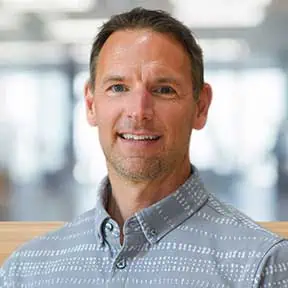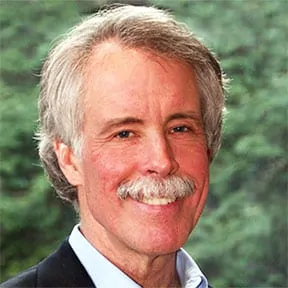

SCS Engineers announces that the firm’s Board of Directors elected Doug Doerr as President and Chief Executive Officer. James J. Walsh, the current President and CEO, will turn over his responsibilities to Doerr on January 1, 2024.

Doerr, a Senior Vice President, has over three decades of professional engineering experience spanning the firm’s solid waste and environmental services practices. He brings strategic direction and operations experience as SCS’s geographically largest Business Unit Director. Doerr also serves on SCS’s Board of Directors and was one of the founding principals of Aquaterra Environmental Solutions, Inc., which merged with SCS in 2013.
A Professional Engineer in six states, Doerr earned his Bachelor of Science in Civil Engineering at the University of Nebraska, Lincoln, and his Master of Business Administration at the University of Kansas. He serves clients in North America by providing technical expertise, primarily in the solid waste management and utility sectors.
As an engineer and consultant, Doerr prides himself on providing environmental solutions to address clients’ technical and regulatory challenges by understanding the business, economic, and social drivers that frame each challenge. Over his career, he has successfully implemented hundreds of environmental solutions that involve studies, permitting, compliance, and design across multiple market sectors for public and private clients.
“Our deep bench of engineers, scientists, consulting professionals, and environmental technicians are employee-owners who drive SCS as one company, keeping us sustainable for over 50 years. From our client’s perspective, our stability and holistic expertise bring a wealth of resources to achieve their goals,” says Doerr.
Walsh will continue to serve as Chair of the Board of Directors and assist Doerr as he transitions into the CEO role. Walsh also plans to spend more time on technical and client work as an expert witness, an authority on elevated temperature landfills, and an expert in the solid waste industry.
Under Walsh’s 22-year tenure, SCS Engineers and its specialty practices, SCS Field Services, SCS Energy, and SCS Tracer have grown tremendously. Walsh, senior executives, and the Board of Directors feel 2024 is an opportune time for the transition.
“We have a stellar reputation, we’re financially healthy, our Employee Stock Ownership Plan is strong, and we have the next generation of leadership ready to lead the company into the future,” states Walsh.
SCS Engineers’ environmental solutions and technology directly result from our experience and dedication to industries responsible for safeguarding the environment as they deliver essential services and products. SCS Engineers has captured or beneficially used more greenhouse gases than any other environmental engineering firm in the U.S. Please visit our website for a greeting from our CEO elect, or watch our video to see what we can do for your business and community.
Infrastructure Week (May 16–23) is a national week of events, media coverage, education, and advocacy efforts to bring the state of the nation’s infrastructure to the attention of all Americans. Forester Media, the publisher of MSW Management magazine, is an Infrastructure Week affiliate. John Trotti, MSW Managing Editor recently surveyed Jim Walsh, P.E., BCEE, President and CEO of SCS Engineers and long-time friend of the magazine on the topic. Jim is first out of the blocks to answer the four questions John asked of respondents from MSW and Forester’s other publications, Business Energy, Erosion Control, Grading & Excavation Contractor, Stormwater, and Water Efficiency.
MSW Management (MSW): Which infrastructure projects should be given priority? Roads and bridges? Dams and levees? Water supply? Electrical grid? Waste management?
James Walsh (JW): Typically public safety, cost, and benefit determine the priority for infrastructure projects, and different political jurisdictions have different priorities. Where highways and bridges are new but waste management facilities are old, the priority might be waste management facilities, and vice-versa. Some types of infrastructure are more amenable to private sector solutions, which can allow the government to focus on other types of infrastructure. The trend in waste management, for example, has been to rely on the private sector in the last decade
Each segment faces difficult challenges; the most significant is funding. Waste management does not necessarily have priority over other projects, but has progressed by regionally identifying the infrastructure necessary. Thus, each region avoids the pitfalls of competing for funding with other regions and other projects.
SCS Engineers focuses on waste management, but there are opportunities to interact with other segments in sustainable ways. For instance, we have energy clients who supply coal ash to specialty cement companies who use it to make “green” cements that last longer in applications such as road construction. We design and construct facilities that take the byproduct gases from the decomposition in landfills to generate electricity reducing their dependence on fossil fuels, or directly use the gas for energy to power wastewater plants simultaneously cleaning and conserving water. We find ways to safely redevelop contaminated property supported by existing infrastructure, thus reducing the need to build new infrastructure.
In short, we work toward helping clients find sustainable solutions to infrastructure projects.
MSW: Is there a solution to long-term infrastructure funding?
JW: With respect to the waste management infrastructure, waste systems require significant capital investment in land, equipment, facilities, and infrastructure. While many governments have decided to rely on private industry instead of financing new governmental facilities, others have become much more sophisticated in adopting private sector approaches to financing. Pro-Forma Economic Life-Cycle Models can assist governmental entities to identify the critical variables that can impact the success of an infrastructure project. Moreover, economic models evaluate how various components of a waste system and variable assumptions integrate together into a sensible approach. Pro Forma Economic Models allow for a careful analysis of the life-cycle costs and potential revenue sources and identify factors that will influence the waste system costs and demonstrate how to adequately and equitably fund the system. These Models provide different scenarios and eliminate options that are not financially feasible or do not fit a region’s short- and long-term needs or priorities. Sensitivity analysis can be conducted to understand better the impact these variables have on capital costs, operating expense, and the overall system economics. By assessing the economic and regional benefits first, we can focus on designing and building infrastructure solutions that are safer, longer lasting, and affordable. Other benefits include adjusting the Model if there is a major change in the commodity market, such as plastics’ recycling is experiencing now and when considering the use of new technologies.
Every industry segment and every region have a different blend of socio-political conditions, geography, and monetary resources—we assess and design to their particular needs. Adopting new waste management technologies, such as anaerobic digestion or waste diversion, as part of an overall waste management program can be integrated into the Model to study how, and if, they sensibly integrate within the existing program. New technologies are typically more expensive than mature technologies such as recycling facilities and landfills, but that condition alone is not why they are considered valuable to a region. The framework considers elements key to integrating anaerobic digestion for example into a long-term program. Capital investment, a significant centralized source of high-quality organic waste, power costs and economic utility incentives, limited land suitable for composting, lack of conventional waste-to-energy facilities, or a ban on organics disposal in landfills are some of the considerations.
Many states are developing organics diversion initiatives, discouraging or banning organics from landfills; they will want to develop separate capacity for diversion within their overall program to build a sustainable plan for the long-term. In some states there is plenty of environmentally sound landfill capacity, recycling facilities have adequate capacity, and the socio-political climate has different ideals. What works in Iowa might not be suitable for California.
MSW: What kind of harm is the current state of our infrastructure doing to the economy and the community?
JW: Every four years, the American Society of Civil Engineers releases a “Report Card for America’s Infrastructure” depicting our nation’s infrastructure condition and performance. In a traditional school report card format, individual infrastructure segments are assigned letter grades—solid waste has the highest grade of B- in the most recent report published in 2013. The waste management infrastructure in the United States is robust, diverse, and significantly supports our economy and communities by providing safe and cost-effective management of the materials that we discard on a daily basis.
MSW: What can various government entities—from local to Federal—do to attract private sector support and investment?
JW: In the United States, private solid waste facilities manage 75% of the municipal wastestream. The waste management industry has many examples of public/private partnerships and significant investment by the private sector. Just look at firms like Waste Management Inc., Republic Services Inc., Waste Industries, Waste Connections, WCA Waste Corporation, Covanta, and Wheelabrator, which own and operate numerous landfills, compost facilities, waste-to-energy facilities, transfer stations, processing facilities, alternative technologies, and hauling companies. These facilities require significant private investment. Allowing private industry to participate in the management of waste management infrastructure brings needed fiscal discipline and accountability to the overall waste system infrastructure.
The private sector is attracted to markets that are predictable and that provide an appropriate return on investment. Jurisdictions with a reputation for making sudden unpredicted changes in regulations that adversely affect the return on investment will find it difficult or impossible to attract private sector support.
The waste management sector and SCS Engineers have seen our share of magic technologies that are literally too-good-to-be-true, yet somehow attract governmental support both financial and otherwise. It is fine for government agencies to provide grant support for research related to promising new technologies, but adopting an unproven technology as the sole means of waste management is inviting a public health crisis. Private sector investment is not attracted to jurisdictions that have unrealistic expectations.
About James Walsh, PE, BCEE, President and CEO of SCS Engineers

Jim has worked at the forefront of sustainable waste management for more than 40 years. He has authored numerous publications, technical support documents, presentations for the USEPA, US DOE, the Gas Research Institute while serving the Solid Waste Association of North America (SWANA), National Waste and Recycling Association (NWRA), and the Environmental Research and Education Foundation (EREF), among others.